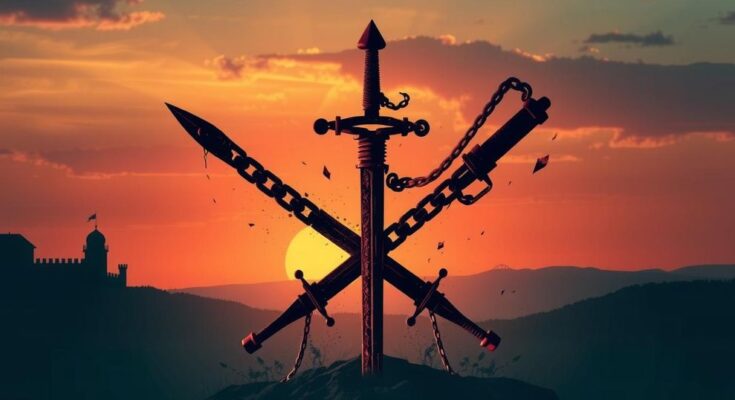The Sudanese army has advanced in northern Khartoum, claiming a key RSF stronghold. President Al-Burhan ruled out negotiations unless the RSF disarms, emphasizing a military victory as the only solution. Amid ongoing violence, plans are in place for a technocratic government to guide Sudan during this turmoil.
On Saturday, the Sudanese army announced its seizure of a strategic stronghold in northern Khartoum previously held by the Rapid Support Forces (RSF). This military advance positions the army to potentially control all of northern Khartoum, further consolidating its authority in the capital region, which includes Khartoum and Omdurman, as reported by Agence France-Presse.
Army spokesman Nabil Abdullah indicated that the military has successfully cleared the Abu Quta area and adjacent locations east of the Nile and Kafouri, targeting remnants of what he termed the “Daglo terrorist militias,” a reference to RSF commander Mohamed Hamdan Daglo, also known as Hemedti. The Abu Quta district, a prosperous area in Khartoum with a population of over one million, served as a crucial RSF base.
The violent conflict between the Sudanese army and the RSF, which erupted in April 2023, has led to a large-scale military offensive by the army aimed at regaining comprehensive control over Khartoum. An anonymous source from the army indicated that its forces are advancing towards the center of the capital to expel the RSF from its remaining positions.
In recent developments, the army announced that it had cleared the Al-Rumaila and industrial areas in central Khartoum, situated just three kilometers from the Presidential Palace, still under RSF occupation. This ongoing conflict has tragically caused tens of thousands of fatalities, displaced over 12 million individuals, and drastically compromised Sudan’s infrastructure, leaving most healthcare facilities non-functional.
Sudanese Sovereign Council President Abdel Fattah Al-Burhan emphasized on Saturday that the army would only engage in negotiations with the RSF if they first lay down their arms. He rejected invitations for cease-fire agreements during Ramadan, insisting that the RSF must withdraw from all regions and concentrate in specific locations before any discussions take place.
Al-Burhan stressed that the army aims to avoid granting the RSF any advantages through cease-fires, declaring that military operations will persist until the siege of Al-Fashir is lifted. He expressed confidence in the army’s plans to ultimately control the entire country, reiterating a commitment to victory and stating that the forces representing the army encompass all Sudanese citizens.
Furthermore, Al-Burhan indicated preparations are underway to establish a technocratic government, including consultations to appoint a civilian prime minister. He assured that political recommendations will receive due attention while aiming to facilitate the continuation of military operations.
Regarding the future political order, Al-Burhan made it clear that the National Congress Party, associated with former President Omar al-Bashir, would not regain power and urged its leaders to refrain from exploiting the current turmoil. He asserted that those desiring political authority should participate in future elections instead of trying to assume control amidst the nation’s suffering.
Finally, addressing the Coordination of Civilian Democratic Forces (Tagadum) and the Forces for Freedom and Change, Al-Burhan compared them to the National Congress, concluding that they, too, will not have an opportunity for power if they remain connected to the RSF. He expressed openness to collaborating with Tagadum provided it distances itself from the RSF.
The conflict in Sudan began in April 2023, fueled by disputes between the Sudanese army and the Rapid Support Forces (RSF). The RSF, originally formed to combat insurgencies, has since evolved into a powerful paramilitary group, influenced by its leader, Mohamed Hamdan Daglo. The struggle for control over Khartoum and surrounding areas comes amidst significant humanitarian crises, including widespread displacement and healthcare collapse, resulting from ongoing violence.
The Sudanese army’s recent successes in northern Khartoum underscore its strategic military objectives against the RSF. President Al-Burhan’s insistence on preconditions for negotiation reflects a broader strategy aimed at undermining the RSF’s military capacity while preparing for a new governmental structure. As the conflict continues, the humanitarian toll remains dire, necessitating urgent international attention and assistance.
Original Source: www.dailynewsegypt.com




